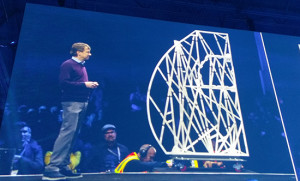 Airbus and Autodesk‘s design studio, The Living, have designed and developed the largest 3D-printed metal part for a commercial airplane in history, what they call a “bionic” partition that is 3D-printed from a direct metal laser sintering (DMLS) “printer” that uses a new super-strong alloy called scalmalloy to achieve the lightness of aluminum with the strength of titanium.
Airbus and Autodesk‘s design studio, The Living, have designed and developed the largest 3D-printed metal part for a commercial airplane in history, what they call a “bionic” partition that is 3D-printed from a direct metal laser sintering (DMLS) “printer” that uses a new super-strong alloy called scalmalloy to achieve the lightness of aluminum with the strength of titanium.
Already used for small parts, often with complex shapes, the Airbus/Autodesk project brings additive manufacturing into the plane’s cabin. The assembly is for a partition that separates the passenger cabin of an A320 from the rear galley.
Autodesk CTO Jeff Kowalski unveils the new Airbus A320 “bionic” partition, made of 112 3D-printed parts. The resulting “bionic” replacement is a stronger partition compared to the current model that also saves 55 pounds in weight. If one final test is passed next month, the new partition will be in every new A320 next year. The companies estimate that using it will remove 96,000 tons of CO2 a year thanks to less jet fuel being burned to transport the lighter partition system.



